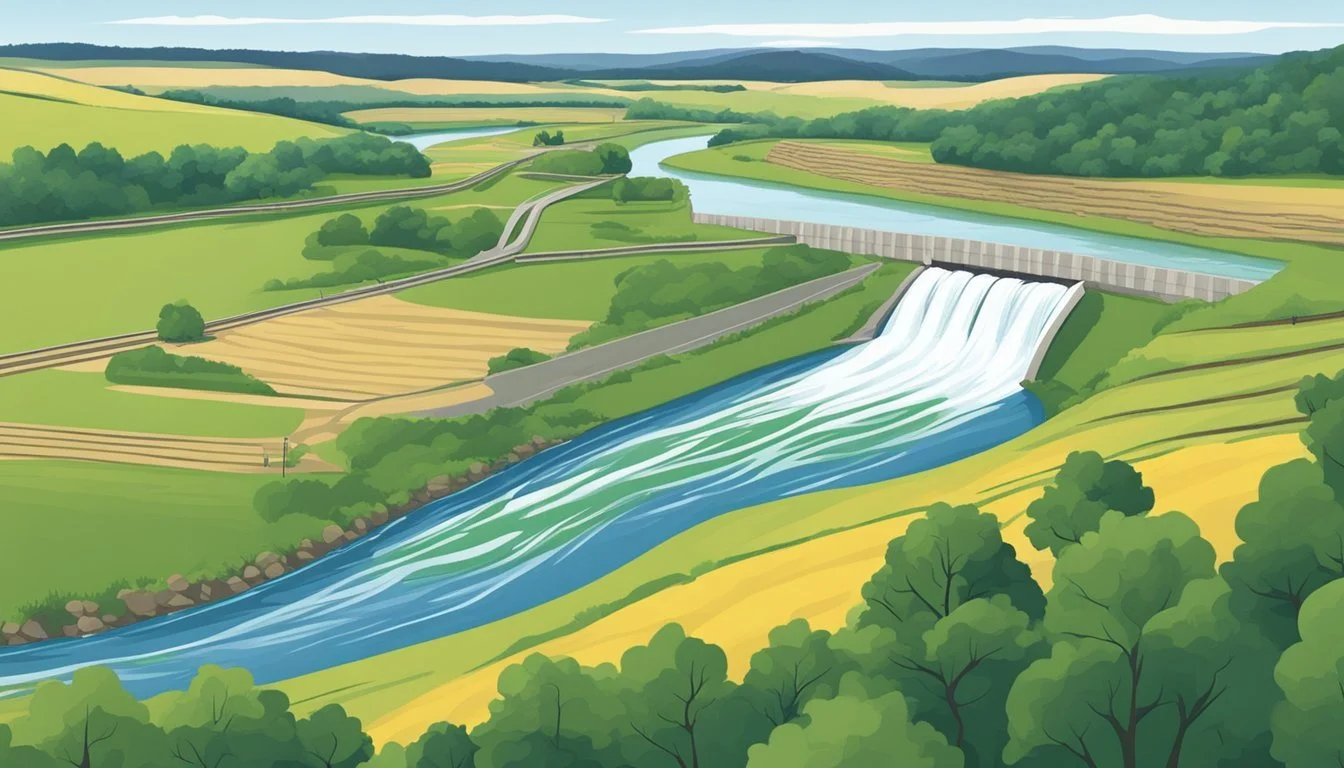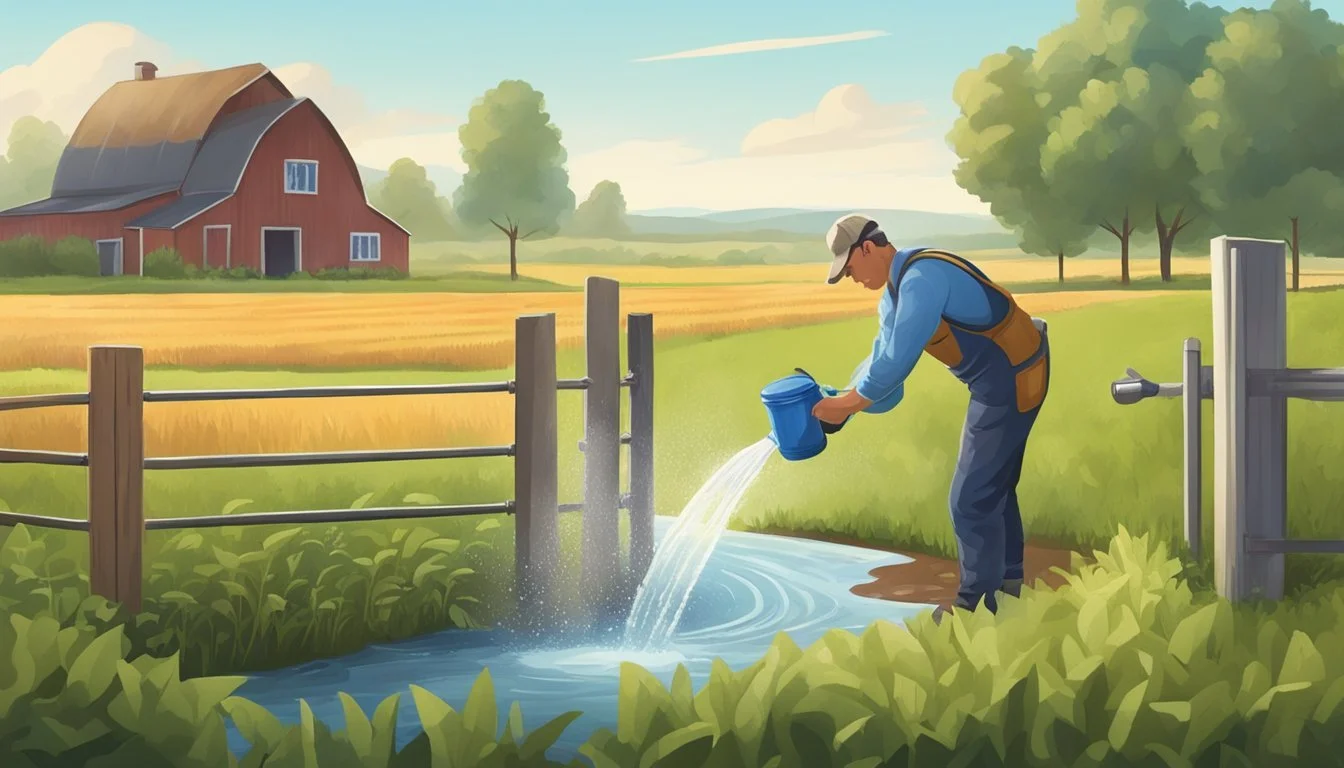Water Rights in Missouri
Navigating Legislation and Ownership
Water rights in Missouri are governed by a complex legal framework that reflects the state's unique geography and resources. As home to two of the nation's longest rivers—the Missouri and the Mississippi—water is an integral part of the state's ecology, economy, and history. The laws in the state blend riparian rights with the reasonable use doctrine, establishing legal guidelines for landowners whose property abuts rivers or other bodies of water.
Missouri's riparian rights law grants landowners adjacent to a watercourse the right to reasonable use of the water as long as it does not interfere unduly with the rights of other landowners. Alongside these rights, the Reasonable Use law works to ensure that the water rights exercised by one do not adversely impact the use of water by others in the vicinity. The state's historical approach to regulating water resources has evolved through both legislation and court decisions, which have clarified the rights and duties of the diverse set of water users, including agricultural, industrial, and recreational stakeholders.
Legislative and legal updates continue to shape the water rights in Missouri, emphasizing the protection of water resources and the fair distribution of access. Major water regulations, such as the Major Water Users Law, set standards and establish fees to oversee the industry and protect groundwater. This balance of rights and duties underscores Missouri's efforts to sustainably manage its vital water resources for current and future generations.
Overview of Water Rights in Missouri
In Missouri, water rights are governed by a blend of doctrines, primarily the riparian water law, but also incorporate aspects of prior appropriation. This creates a legal landscape unique to the state that affects landowners and water users across Missouri.
Riparian Water Law
Under the Riparian Water Law in Missouri, landowners whose property abuts a natural watercourse have the right to make reasonable use of the water. This means that they may use the water for domestic needs, agriculture, industrial purposes, and recreation provided their usage does not harm downstream owners. The law is based on the principle that water is an integral part of the land and ownership of riparian land takes with it the right to water from the watercourse.
Prior Appropriation
Although Missouri is not a traditional Prior Appropriation state, aspects of this doctrine are applied when the riparian doctrine is not suited to resolve conflicts, particularly in cases involving large-scale water diversions or when non-riparian water rights are in question. Under prior appropriation, water rights are granted based on a "first in time, first in right" basis, and the rights are separated from the land ownership.
Hybrid Legal Frameworks
Missouri operates a hybrid legal framework that incorporates elements of both riparian rights and prior appropriation. Major water withdrawals require permits, which reflects the appropriation system, while riparian rights continue to influence local water management and landowner usage. This combination allows Missouri to adapt the legal rights to water in a way that considers both historical patterns of water use and the needs of modern water users.
Groundwater and Surface Water Regulations
In Missouri, water regulations establish the framework for managing both groundwater and surface water resources. These rules are designed to ensure the responsible use and equitable distribution of water, taking into account the state's specific environmental and legal context.
Groundwater Access and Control
Missouri employs a balanced approach to groundwater access, recognizing the right of landowners to the reasonable use of the water beneath their property. They do not face state-mandated limits on the quantity of water they can withdraw; however, their use is guided by the doctrine of reasonable use. This means that groundwater resources must be used without causing harm to neighboring properties or the aquifer system as a whole.
Doctrine of Reasonable Use: Allows for fair utilization of groundwater.
No Quantitative Restrictions: Landowners can use groundwater without state-imposed volume restrictions.
Surface Water Use and Distribution
For surface water, Missouri adheres to the riparian rights doctrine, granting landowners whose property abuts lakes, rivers, and streams the right to make use of that water. Use must be reasonable and cannot interfere unreasonably with the rights of other riparian landowners. Missouri's laws also emphasize the conservation and sustainable management of water resources to support agriculture, industry, recreation, and other needs.
Riparian Rights Doctrine: Ensures access to water for properties adjacent to water bodies.
Conservation and Sustainable Use: Encourages protective practices for long-term water availability.
Laws like the Clean Water Act also play a critical role in setting quality standards for surface water and regulating the discharge of pollutants, thereby safeguarding Missouri’s surface water resources for current and future generations.
Water Rights for Landowners
In Missouri, landowners have specific provisions under the state law that govern the use and rights to water on or adjacent to their property. Knowing the legal framework is crucial for both riparian and non-riparian property owners to understand their rights and obligations.
Establishing Rights to Use Water
Riparian rights are afforded to landowners whose property touches a body of water, such as a stream, river, or lake. These rights allow property owners to make reasonable use of the water as long as it does not significantly harm other users or landowners downstream or adjacent. In Missouri, the concept of reasonable use has been refined by recent case law, which provides guidance on how such water usage is determined and adjudicated.
For non-riparian landowners, the right to use water is not attached to their real property directly. However, they may still acquire rights to water resources through other legal means, such as permits or specific allocations defined by state regulations.
Rights of Riparian and Non-Riparian Landowners
Riparian landowners enjoy the inherent right to reasonable use of water resources for purposes such as irrigation, power generation, and domestic use. This is provided that such use does not deprive neighboring landowners of their right to similarly benefit from the water body. The principle of reasonable use is staple in Missouri Water Laws and serves as a benchmark for resolving disputes.
Non-riparian landowners must navigate a more complex legal landscape, as water rights are not automatically implied by property ownership. They may need to utilize groundwater or seek rights to draw from nearby water sources through legal channels, which are often governed by state oversight. In Missouri, major water users who withdraw or divert more than 100,000 gallons per day must be registered, highlighting the state's regulatory approach to water resource management as highlighted in the Frequently Asked Major Water User Questions.
In both scenarios, landowners must balance their needs with the legal expectations and rights of others, ensuring that water use is fair and equitable under the state's laws.
Water Usage and Permitting
In Missouri, water rights are determined by the principle of reasonable use, which does not typically require a permit for water usage for activities such as agriculture and recreation. However, entities that expect to exceed certain thresholds must report their usage to the state.
Agricultural and Recreational Use
Agricultural users in Missouri, including those who employ irrigation practices, benefit from the state's reasonable use policy. Typically, this allows farmers to use water from adjacent water bodies for their crops without the need for a permit. However, if an agriculture entity anticipates using more than 70 gallons per minute or 100,000 gallons per day, they must then register their water use. Recreational use of water also falls under this category, where entities such as golf courses use water bodies for maintenance purposes without stringent regulatory oversight.
Industrial and Municipal Water Use
For industrial and municipal water users, the state of Missouri imposes more structured regulations. They are considered major water users and are subject to different rules, which include registering and reporting their water usage due to the potentially significant volumes of water they withdraw. The Missouri Department of Natural Resources provides governance for this sector, ensuring the protection of the state’s water resources while also facilitating the necessary water use for these entities. Major water users are outlined as those with the capacity to surpass established usage thresholds, and do not face penalties as long as they comply with the reporting requirements.
Disputes and Legal Enforcement
In Missouri, water rights are a delicate balance between private ownership and public welfare. Disputes can arise when these rights are perceived as infringed upon, leading to a need for legal enforcement to uphold reasonable use principles and ensure the fair distribution of resources.
Addressing Water Rights Conflicts
When individuals or entities in Missouri believe their water rights have been infringed upon, often through trespass or excessive use by others, they may seek resolution through legal channels. Missouri Water Laws outline the doctrine of reasonable use, which protects landowners’ rights to use water from sources that cross or border their land, provided it does not harm adjacent landowners' rights. Legal disputes are typically resolved in civil courts, where evidence of harm or violation of laws must be presented. Engaging lawyers with experience in water rights is crucial for the complex navigation of these conflicts.
Role of the Missouri Attorney General
The Missouri Attorney General plays a vital role in enforcing water laws and regulations. When statewide water interests are affected, such as in cases of pollution or public harm, the Attorney General has the authority to act on behalf of the state. This can include bringing forth lawsuits to address and rectify violations of Missouri's water regulations. The Attorney General's office also offers guidance on water law and may intervene in disputes that have broader implications for the state’s water resources or that involve state entities.
Missouri's Water Management Authorities
In Missouri, the Department of Natural Resources (DNR) plays a pivotal role in water regulation, working within frameworks like the Missouri Water Law to ensure the responsible management and protection of the state's water resources. The department operates alongside specialized bodies such as the Missouri Geological Survey, integral in understanding and maintaining the geological aspects of Missouri's water systems.
Department of Natural Resources
The Missouri DNR is charged with overseeing the state's water resources, ensuring that standards are met to protect groundwater quality. It has the authority to adopt and amend rules to govern industries related to well, heat pump, and monitoring well installations, guided by statutes like the Major Water Users Law, which is aimed at sustainable development.
Key Responsibilities:
Regulation of water-related industries
Protection of groundwater
Administration of water resource laws
Missouri Geological Survey
The Missouri Geological Survey, an entity within the DNR, focuses on the scientific investigation and mapping of the state’s geology. It has a significant impact on how water resources are managed, especially in providing data necessary for informed decision-making regarding water use and conservation.
Functions:
Geological mapping and research
Data provision for water management
Support informed water use policies
In concert, the DNR and the Geological Survey, through the Water Resources Center, work to integrate scientific data and regulatory measures to manage Missouri's precious water resources effectively and sustainably.
Environmental and Conservation Considerations
In Missouri, the interplay between environmental stewardship and legal frameworks is pivotal for conserving water resources. The focus is on safeguarding wetland habitats and maintaining water quality, with both federal and state entities playing crucial roles.
Protection of Wetlands and Ecosystems
Missouri's wetlands are integral to its ecosystem, providing habitats for diverse species and acting as natural water purification systems. Conservation efforts led by the federal government in collaboration with state authorities aim to protect these critical areas. These initiatives are not only vital for wildlife but also for bolstering the state's natural resilience against flooding and erosion.
Water Quality and Pollution Control
Maintaining water quality is a high priority, as it directly impacts the health of the ecosystem and public well-being. Missouri enforces strict regulations to control pollution and ensure the health of its waterways. This involves stringent monitoring by state agencies to prevent contaminants from degrading water quality and ensuring compliance with the Clean Water Act, underscoring the state's commitment to a balance between use and conservation of its water resources.
Water Rights in Context: Missouri vs Other States
Water rights have become a focal point of legislative action, particularly in regions where water scarcity is an emerging challenge. The state of Missouri has been active in establishing policies aimed at preventing the out-of-state export of its water resources, contrasting with approaches taken by states with differing hydrological landscapes.
Comparative Water Laws: Missouri and California
Missouri's legislation surrounding water rights has largely been developed with the intention to conserve and manage water within the state's borders. This reflects a stark contrast to California, where water rights are managed under the doctrine of prior appropriation, which allows rights to water to be sold or transferred apart from the land. In California, water laws have evolved to address water scarcity, reflecting the state's drier conditions and greater propensity for droughts.
In Missouri, water rights are grounded in the reasonable use doctrine, where landowners have the right to use water as long as it does not harm neighboring landowners. This approach is inherently different from California’s system, which reflects the more arid conditions of the Western United States and prioritizes water usage based on a hierarchical system of claims.
Water Rights in the Western United States
The Western United States, characterized by arid and semiarid climates, has different challenges when it comes to water rights. States often rely on complex systems like prior appropriation to govern water rights due to the region's limited water availability. In contrast, Missouri, with its more humid climate and abundant waterways, does not face the same level of aridity and has not adopted such measures.
Furthermore, the Western States typically need to allocate water across vast areas with significant agricultural and urban demands. Complex interstate agreements and legal frameworks are in place to manage water distribution amongst these states, a situation less common in Missouri due to its relatively ample water supply.
Contact and Resources
Understanding water rights in Missouri is essential, and seeking the appropriate contacts for guidance and legal assistance is crucial. Below are official resources that provide valuable information and contact details for those in need of support or guidance regarding water rights and regulations.
Department Contact Information
Missouri Department of Natural Resources – Water Division
A primary point of contact for water-related queries and regulatory information.
Mail: P.O. Box 176, Jefferson City, MO 65102-0176
Contact: 573-751-3443
Email: water@dnr.mo.gov
Missouri Senate Committee on Agriculture, Food Production, and Outdoor Resources
The committee addresses concerns and legislative matters regarding water resources.
Contact: Refer to the Missouri Senate website for committee details.
Major Water Users Registration Assistance
Phone: 573-751-3443
Email: info@dnr.mo.gov
Legal Resources and Assistance
Missouri Attorney General's Office
For those seeking legal advice on water rights and disputes.
Mail: Supreme Court Building, 207 W. High St., P.O. Box 899, Jefferson City, MO 65102
Contact: 573-751-3321
Email: Contact form
Locating a Water Rights Lawyer
Lawyers specialized in water rights can provide legal assistance and representation.
Registration: Use the Missouri Bar Lawyer Search to find registered attorneys specializing in environmental law.
Contact: The Missouri Bar, P.O. Box 119, Jefferson City, MO 65102
Phone: 573-635-4128
For further information on regulations, the Citizens Guide to Water Rules and Regulations provides an overview of Missouri's groundwater protection standards and fees to administer the law.
Frequently Asked Questions
In the state of Missouri, water rights and usage are subject to a range of specific regulations and case law precedents. This section addresses common inquiries related to the management, legalities, and responsibilities of water resources in Missouri.
How are water rights regulated and managed by the Missouri Department of Natural Resources?
The Missouri Department of Natural Resources (DNR) is responsible for water rules and regulations in the state, governing such aspects as well installation and groundwater protection to ensure sustainable use of water resources.
What regulations govern private well usage and shared well agreements in Missouri?
Missouri's DNR establishes standards for the regulation of wells and pump installations, in addition to overseeing shared well agreements to protect the state's groundwater.
What is the legal framework surrounding the ownership and use of creek water on private property in Missouri?
The ownership and use of creek water draws upon case law, which asserts that the right to float on a stream does not authorize trespassing on private property, although navigable streams are available for public use under federal law.
How do riparian rights function under Missouri law?
Riparian rights in Missouri ensure that landowners whose property abuts a body of water – such as a river or lake – have equitable access to the water for utilitarian purposes like drinking, bathing, and irrigation.
What are the requirements for water testing as stipulated by the Missouri Department of Natural Resources?
Water testing regulations and requirements in Missouri are detailed by the DNR, with an aim to safeguard the state's water quality from contaminants and pollutants.
How does one determine water table depths and their impact on property rights in Missouri?
Understanding water table depths is essential for evaluating their impact on property and water rights. In Missouri, the process typically involves hydrogeological assessments, but there are no specific state laws or policies dictating the quantity of water usage based on these depths, as Missouri adheres to riparian water law.









